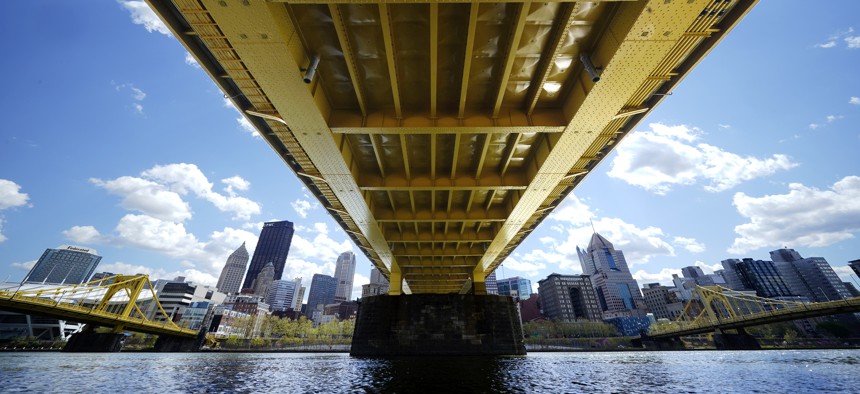Buttigieg Emphasizes Need for Regional Cooperation on Infrastructure Grants

The recently refurbished Andy Warhol bridge spans the Allegheny River into downtown Pittsburgh, April 19, 2021. AP Photo/Gene J. Puskar, File
Speaking to city leaders, the transportation secretary also said his department would strive to make programs "user friendly" for communities of all sizes and highlighted road safety efforts.
Transportation Secretary Pete Buttigieg in remarks to city leaders Thursday indicated that his department would be on the lookout for proposals that incorporate regional cooperation as it oversees millions of dollars in new grant funding that is available under the infrastructure law President Biden signed this week.
Buttigieg, speaking at a National League of Cities event, also emphasized that the Transportation Department would strive to ensure smaller and mid-sized communities, not just bigger ones, gain access to competitive funding. And he noted that DOT would be working to build "more of a national safety strategy" for roadways.
DOT, Buttigieg said, is not necessarily going to define regions for some competitive grant programs, leaving it instead up to applicants to make that determination. "You can tell us what constitutes a meaningful region for the purposes of transportation," he said. "We want to make sure that we reward that kind of regional cooperation."
Of the $550 billion in the infrastructure package, about $284 billion is for transportation. Based on a recent analysis from the Eno Center for Transportation, there's about $100 billion in competitive grants available for state and local governments that Buttigieg and the Transportation Department will control.
Buttigieg, the former mayor of South Bend, Indiana, pledged that DOT would try to be "equally available and user friendly" to communities of all sizes. "The reality is most cities don't have a full-time person here in Washington, D.C. to help navigate these federal processes," he said.
He added that this approach would be especially important with new programs, noting there would be dozens of these under the law.
With safety programs, Buttigieg urged cities to shape their plans based on "on the ground listening" and feedback from people disproportionately affected by the safety risks on the nation's streets.
He also suggested that local governments should flag ideas that are working to DOT. "We're going to bring the considerable research and policy resources of our department," he said. "We also know that a lot of the answers are coming from the bottom up."
Bill Lucia is a senior editor for Route Fifty and is based in Olympia, Washington.
NEXT STORY: Five Ways Government Leaders Can Develop Future Infrastructure Workers






